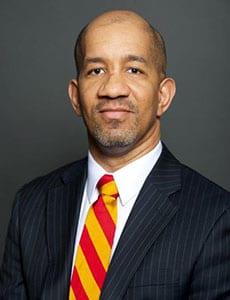Are You Interested in a Career in K-12 Education?

A career in education can be both challenging and rewarding. Teachers are more than educators; they are also leaders and mentors. Working in K-12 education is an opportunity to make a difference in the lives of children and strengthen communities throughout our country.
Why Do We Need More African American K-12 Educators?
In 2015, the National Center for Education Statistics projected that more than 50% of the students enrolled in K-12 public schools were students of color. According to a 2016 report from the U.S. Department of Education, however, only 18% of educators are people of color—African American males in particular only represent two percent. As reported in 2018 by U.S. News & World Report, African American students who have one African American teacher by the time they reach third grade are 13% more likely to go to college, and students who had at least two African American teachers were 32% more likely to enroll in college. Other studies have found that having an African American teacher also leads to better test scores, more positive views of school, fewer suspensions and expulsions, more referrals to gifted classes and lower dropout rates. Black teachers, research has found, also have higher academic expectations for Black students than other teachers.

Philander Smith University
Historically Black colleges and universities (HBCUs) have historically been leaders in the support and development of Black teachers and continue to do so today.. The U.S. Department of Education also reports that 16% of African American teaching candidates trained at an HBCU.
Why Should You Go Into K-12 Education?
If you believe in the power of K-12 education to change students’ lives and transform communities, a career as a K-12 educator may be the right choice for you. A passion for teaching is equally as important. Being comfortable speaking in front of a group and in a one-on-one conversation, will serve you well as a teacher. Additionally, whether you’re teaching all subjects as an elementary educator or you plan to teach a particular topic on the secondary level, make sure you’re excited to invest in the disciplines you’ll be teaching. Schools need effective teachers to teach classes and guide students through challenging coursework, building the academic and social skills needed to ensure students are successful in college, career and life.
Want to learn more about this possible career path and college major?
Have questions about which UNCF colleges and universities offer this program?
Looking for help with financing this degree?
Click Here so We can Help You!
Preparing for Success
As a student yourself, it’s likely that you already have established connections with educators who teach in your area of interest or otherwise inspire you. Talk to your favorite teachers and ask about the path they took to a career in education: Where did they go to school? What inspired them to become a teacher? Did they major in education, or in the subject that they now teach?
As you start to explore your postsecondary options, look at colleges that are accredited by the National Council for Accreditation of Teacher Education (CHEA). As you begin to select schools that you’re interested in, reach out to their education departments and ask questions about the program and where their graduates typically end up.
Choose a major in education and/or the subject you wish to teach, depending on where and what level you want to teach. A career counselor or professor at your school can help you decide which path will get you where you need to go.
UNCF Schools to Check Out
Plenty of great UNCF HBCUs offer degrees in education. The School of Education, Health and Human Services at Benedict College includes the Education, Child and Family Studies Department, which is CHEA accredited, to prepare students to become educators. Also accredited by CHEA is Philander Smith University in Little Rock, AR, which prepares students to be outstanding educators for K-6 who will become community leaders and model appreciation for diversity in the classroom. Xavier University of Louisiana, located in New Orleans, LA, offers a bachelor of arts degree in elementary education (grades 1-5), English education (grades 6-12), French education (grades K-12), social studies education (grades 6-12), Spanish education (K-12), as well as several graduate degrees in education. The Division of Education at Rust College, located in Holly Springs, MS, offers bachelor of science degrees in the licensure areas of elementary education.
Scholarships
In addition to the UNCF General Scholarship Award for any student going to a UNCF-member college, regardless of their major, there are other scholarships available. The UNCF K-12 Education Fellowship Program helps students committed to education. The Coca-Cola First Generation Scholarship provides renewable awards up to $5,000 to students who are first in their families to attend college.
If you feel you need some guidance as you explore all the different K-12 education degree programs, you’re not alone! Submit a major interest form on our website to get the ball rolling. And to keep the updates coming, make sure to follow us on UNCF social media channels. This way, you can be the first to hear about our scholarships and member HBCUs. We are intent on providing our students with all the resources they need, so reach out today!
 Sekou Biddle, UNCF’s Vice President, Advocacy, leads UNCF’s advocacy efforts to ensure more African American students will be college-ready and better prepared to enroll in and complete college by driving sustainable education reforms that benefit students and empower parents and communities to demand improvement.
Sekou Biddle, UNCF’s Vice President, Advocacy, leads UNCF’s advocacy efforts to ensure more African American students will be college-ready and better prepared to enroll in and complete college by driving sustainable education reforms that benefit students and empower parents and communities to demand improvement.